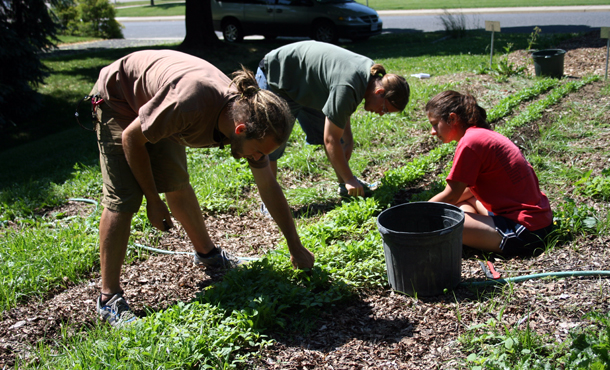When the group in charge of the Community Supported Agriculture program at Eastern Mennonite University sent out a mass email offering shares, the response was swift and overwhelming.
“Within the first 24 hours, we had just about 30 requests for shares,” said Taylor Weidman, one of the original masterminds behind the CSA project. “We obviously couldn’t fill them all.”
The group could only invite 11 of those 30 to purchase a share, which entitles the holder to a portion of the produce grown on campus from May through September.
Each participant invests $100 in May and $100 in July, or they contribute an equal amount through labor in the campus gardens.
EMU’s Sustainable Food Initiative club, which also runs a produce stand in the fall and transports excess cafeteria food to local nonprofits, operates the CSA program.
“There’s been a lot of institutional support, but the movement has come from the student body,” explained Weidman.
Last year, the program’s first, the CSA offered just six shares.
“We were just testing the model,” said Weidman before heading out to harvest produce from one of the five campus gardens used for the project.
Half those shareholders returned – the others backed out because they started their own gardens – bringing the total number of shareholders this year to 14.
The project is quickly growing. Next summer, the group could offer 20 to 25 shares, explained Weidman, a 23-year-old EMU grad who majored in environmental sustainability, economics and peacebuilding.
The CSA project weaves all those concepts together and then some. It unites the university’s community while creating edible landscaping that returns dollars to the local area, Weidman says.
The program is made possible thanks to support from faculty, staff and students, all of whom are represented among the shareholders.
EMU’s Physical Plant allows four summer employees to spend part of their workdays tending the gardens, while some of the upkeep also comes from volunteers, Weidman said.
After the CSA season is over, produce still sprouting from the garden will be sold to the university’s cafeteria, he added.
“The reason this is a little different from most [CSAs] is that we’re growing produce on a campus,” Weidman said. “This is one of the best examples of local agriculture, because the revenue generated from this is going back into this place.”
Article courtesy Daily News Record, July 23, 2013
